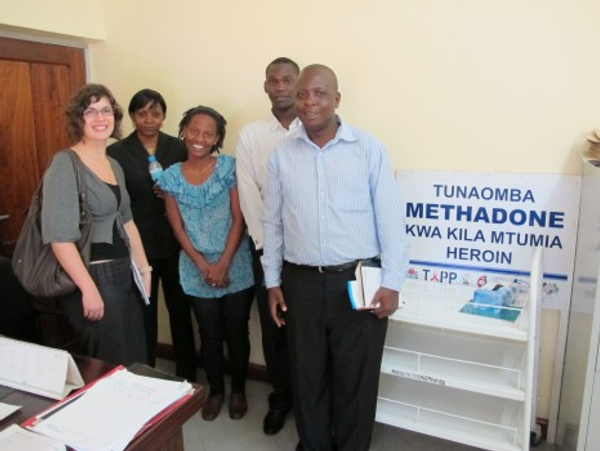Uganda Harm Reduction Network conduct study visit to Tanzania
Jamie Bridge, IDPC Policy and Operations Manager
Wamala Twaibu, Uganda Harm Reduction Network
In November 2012, the Uganda Harm Reduction Network (UHRN) sent a delegation of three staff to visit the progressive harm reduction services in Dar es Salaam, Tanzania. The study visit was coordinated and funded by the International Drug Policy Consortium (IDPC) and Harm Reduction International (HRI) as part of the on-going network development in Africa. Two IDPC staff also took part in the visit.
We first visited the state-run methadone programme, housed in the Psychiatric Department of the Muhimbura Hospital in the north of the city. There are nearly 600 clients in this pilot programme and the uptake is growing exponentially. All clients are referred by NGO outreach workers. Upon registration, they provide photos and finger prints for their identity cards and are then assessed by doctors, social workers, psychologists and a psychiatric nurse – providing a comprehensive examination of general health, mental health, drug use (confirmed via urine tests), legal issues, social issues, and support networks. Clients are also regularly tested for HIV, tuberculosis and hepatitis, and the service has naloxone available in case of any overdoses. However, the service only enrols people who inject drugs, and there have been reports of clients beginning to inject just to access the programme.
One key feature of the methadone programme was the integration of occupational therapy in order to help clients transition out of the programme and into work. This also helps reduce the stigma associated with drug use and the clients under methadone. Many clients were engaged in gardening work on the grounds of the hospital, and have helped make the whole facility look beautiful – this has, in turn, helped to change people’s perceptions of the programme itself. Other clients assist with painting and bed-making as part of this programme.
We then visited one of the community-based outreach NGOs that refer clients into the methadone programme – an organisation called Youth Volunteers Against Risky Behaviours (YOVARIBE). This team of outreach workers operate as part of the US-funded Tanzania AIDS Prevention Programme (TAPP). They provide information and support across one area of the city, reaching people who use drugs, sex workers and men who have sex with men, and also work with the broader community to reduce stigma. YOVARIBE also has a social worker who works closely with the methadone programme to assess, support and prepare the 50 clients that they have referred to the hospital.
Finally, we visited a drop-in centre and needle and syringe programme in the Temeke District, operated by Médecins du Monde. The Temeke District is one of the most affected areas of Dar es Salaam in terms of poverty and drug use. Following a situation assessment conducted in 2011, they opened their service to fill an identified gap for harm reduction services – although they do not currently provide opioid substitution therapy, but refer clients into the existing hospital programme. They have a team of outreach workers, peer support workers, nurses and psychologists, and have also provided sensitisation training to around 150 police officers in the city. They have a well-resourced drop-in centre and office building, but also operate an outreach bus which travels across this vast District to provide harm reduction services to people who use drugs. They also work with clients on films and music videos to help reduce stigma, and provide basic services such as showers, food, laundry facilities and a comprehensive package of support (clean needles, condoms, sterile water, etc.).
The study visit was deemed a big success by UHRN staff, who learned a lot about how these programmes operate, the challenges and benefits that they create, and the importance of fully engaging people who use drugs in service delivery and design (read the UHRN report on the visit). The challenge now is to advocate for similar services to begin in Uganda, where the government has thus far been much less supportive of this life-saving work.
Keep up-to-date with drug policy developments by subscribing to the IDPC Monthly Alert.
Regions
Related Profiles
- Uganda Harm Reduction Network (UHRN)
- Harm Reduction International (HRI)
- International Drug Policy Consortium (IDPC)
